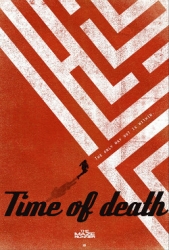A Death in Vienna

A Death in Vienna читать книгу онлайн
The sins of the past reverberate into the present, in an extraordinary novel by the new master of international suspense.
It was an ordinary-looking photograph. Just the portrait of a man. But the very sight of it chilled Allon to the bone.
Art restorer and sometime spy Gabriel Allon is sent to Vienna to authenticate a painting, but the real object of his search becomes something else entirely: to find out the truth about the photograph that has turned his world upside down. It is the face of the unnamed man who brutalized his mother in the last days of World War II, during the Death March from Auschwitz. But is it really the same one? If so, who is he? How did he escape punishment? Where is he now?
Fueled by an intensity he has not felt in years, Allon cautiously begins to investigate; but with each layer that is stripped away, the greater the evil that is revealed, a web stretching across sixty years and thousands of lives. Soon, the quest for one monster becomes the quest for many. And the monsters are stirring…
Rich with sharply etched characters and prose, and a plot of astonishing intricacy, this is an uncommonly intelligent thriller by one of our very best writers.
Внимание! Книга может содержать контент только для совершеннолетних. Для несовершеннолетних чтение данного контента СТРОГО ЗАПРЕЩЕНО! Если в книге присутствует наличие пропаганды ЛГБТ и другого, запрещенного контента - просьба написать на почту [email protected] для удаления материала
And then the old man speaks a few words, and Max Klein feels his spine turn to ice. It is the same voice that ordered him to play Brahms at Auschwitz, the same voice that calmly asked Klein’s fellow inmates to identify the piece or face the consequences. And here was the murderer, prosperous and healthy, ordering an Einspänner and a Sachertorte at the Central.
“I felt as though I was going to be sick,” Klein said. “I threw money on the table and stumbled into the street. I looked once through the window and saw the monster named Herr Vogel reading his newspaper. It was as if the encounter never happened at all.”
Gabriel resisted the impulse to ask how, after so long, Klein could be so certain that the man from Café Central was the same man who’d been at Auschwitz sixty years earlier. Whether Klein was right or not was not as important as what happened next.
“What did you do about it, Herr Klein?”
“I became quite the regular customer at the Café Central. Soon, I too was greeted by name. Soon, I too had a regular table, right next to the honorable Herr Vogel. We began to wish each other good afternoon. Sometimes, while we read our newspapers, we would chat about politics or world events. Despite his age, his mind was very sharp. He told me he was a businessman, an investor of some sort.”
“And when you’d learned as much as you could by having coffee next to him, you went to see Eli Lavon at Wartime Claims and Inquiries?”
Klein nodded slowly. “He listened to my story and promised to look into it. In the meantime, he asked me to stop going to the Central for coffee. I was reluctant. I was afraid he was going to slip away again. But I did as your friend asked.”
“And then?”
“A few weeks went by. Finally I received a call. It was one of the girls from the office, the American one named Sarah. She informed me that Eli Lavon had some news to report to me. She asked me to come to the office the next morning at ten o’clock. I told her I would be there, and I hung up the telephone.”
“When was that?”
“The same day of the bombing.”
“Have you told any of this to the police?”
Klein shook his head. “As you might expect, Mr. Argov, I’m not fond of Austrian men in uniform. I am also well aware of my country’s rather shoddy record when it comes to the prosecution of war criminals. I kept silent. I went to the Vienna General Hospital and watched the Israeli officials coming and going. When the ambassador came, I tried to approach him but I was pushed away by his security men. So I waited until the right person came along. You seemed like him. Are you the right person, Mr. Argov?”
THE APARTMENT HOUSE across the street was nearly identical to the one where Max Klein lived. On the second floor a man stood in the darkened window with a camera pressed to his eye. He focused the telephoto lens on the figure striding through the passageway of Klein’s building and turning into the street. He snapped a series of photographs, then lowered the camera and sat down in front of the tape recorder. In the darkness it took him a moment to find the PLAY button.
“So I waited until the right person came along. You seemed like him. Are you the right person, Mr. Argov?”
“Yes, Herr Klein. I’m the right person. Don’t worry, I’m going to help you.”
“None of this would have happened if it weren’t for me. Those girls are dead because of me. Eli Lavon is in that hospital because of me.”
“That’s not true. You did nothing wrong. But given what’s taken place, I’m concerned about your safety.”
“So am I.”
“Has anyone been following you?”
“Not that I can tell, but I’m not sure I would know it if they were.”
“Have you received any threatening telephone calls?”
“No.”
“Has anyone at all tried to contact you since the bombing?”
“Just one person, a woman named Renate Hoffmann.”
STOP. REWIND. PLAY.
“Just one person, a woman named Renate Hoffmann.”
“Do you know her?”
“No, I’ve never heard of her.”
“Did you speak to her?”
“No, she left a message on my machine.”
“What did she want?”
“To talk.”
“Did she leave a number?”
“Yes, I wrote it down. Hold on a minute. Yes, here it is. Renate Hoffmann, five-three-three-one-nine-zero-seven.”
STOP. REWIND. PLAY.
“Renate Hoffmann, five-three-three-one-nine-zero-seven.”
STOP.
6 VIENNA
THE COALITION FOR a Better Austria had all the trappings of a noble yet ultimately hopeless cause. It was located on the second floor of a dilapidated old warehouse in the Twentieth District, with sooty windows overlooking a railyard. The workspace was open and communal and impossible to heat properly. Gabriel, arriving the following morning, found most of the youthful staff wearing thick sweaters and woolen caps.
Renate Hoffmann was the group’s legal director. Gabriel had telephoned her earlier that morning, posing as Gideon Argov from Jerusalem, and told her about his encounter the previous evening with Max Klein. Renate Hoffmann had hastily agreed to a meeting with him, then broken the connection, as if she were reticent to discuss the matter on the telephone.
She had a cubicle for an office. When Gabriel was shown inside, she was on the telephone. She pointed toward an empty chair with the tip of a chewed pen. A moment later, she concluded the conversation and stood to greet him. She was tall and better dressed than the rest of the staff: black sweater and skirt, black stockings, flat-soled black shoes. Her hair was flaxen and did not reach her square, athletic shoulders. Parted on the side, it fell naturally toward her face, and she was holding back a troublesome forelock with her left hand as she shook hands firmly with Gabriel with her right. She wore no rings on her fingers, no makeup on her attractive face, and no scent other than tobacco. Gabriel guessed that she was not yet thirty-five.
They sat down again, and she asked a series of curt, lawyerly questions. How long have you known Eli Lavon? How did you find Max Klein? How much did he tell you? When did you arrive in Vienna? With whom have you met? Have you discussed the matter with the Austrian authorities? With officials from the Israeli embassy? Gabriel felt a bit like a defendant in the dock, yet his responses were as polite and accurate as possible.
Renate Hoffmann, her cross-examination complete, regarded him skeptically for a moment. Then she stood suddenly and pulled on a long, gray overcoat with very square shoulders.
“Let’s take a walk.”
Gabriel looked out the soot-smudged windows and saw that it was sleeting. Renate Hoffman shoved some files into a leather bag and slung it over her shoulder. “Trust me,” she said, sensing his apprehension. “It’s better if we walk.”
RENATE HOFFMANN, ON the icy footpaths of the Augarten, explained to Gabriel how she had become Eli Lavon’s most important asset in Vienna. After graduating at the top of her class from Vienna University, she had gone to work for the Austrian state prosecutor’s office, where she had served exceptionally for seven years. Then, five years ago, she’d resigned, telling friends and colleagues that she longed for the freedom of private practice. In truth, Renate Hoffman had decided she could no longer work for a government that showed less concern about justice than about protecting the interests of the state and its most powerful citizens.
It was the Weller case that forced her hand. Weller was a Staatspolizei detective with a fondness for torturing confessions out of prisoners and administering justice personally when a proper trial was deemed too inconvenient. Renate Hoffmann tried to bring charges against him after a Nigerian asylum-seeker died in his custody. The Nigerian had been bound and gagged and there was evidence he had been struck repeatedly and choked. Her superiors had sided with Weller and dropped the case.























